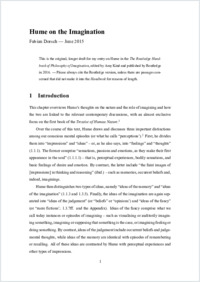Hume on the Imagination
BHAP-PH
- Dorsch, Fabian University of Fribourg
-
2015
28
Hume
imagination
fiction
imaginative resistance
modal epistemology
memory
belief
judgement
perception
impressions
ideas
empiricism
disjunctivism
English
This chapter overviews Hume’s thoughts on the nature and the role of imagining, with an almost exclusive focus on the first book of his Treatise of Human Nature. Over the course of this text, Hume draws and discusses three important distinctions among our conscious mental episodes (or what he calls ‘perceptions’): (i) between impressions (including perceptual experiences) and ideas (including recollections, imaginings and occurrent beliefs); (ii) between ideas of the memory and ideas of the imagination; and (iii), among the ideas of the imagination, between ideas of the judgement (i.e. occurrent beliefs) and ideas of the fancy (i.e. imaginings). I discuss each distinction in turn, also in connection to contemporary views on imagining. In addition, I briefly consider Hume’s views on the imagination as a faculty aimed at the production of ideas, as well as on the role that imagining plays in the wider context of our mental lives, notably in the acquisition of modal knowledge and in the comprehension of stories and opinions that we take to be false or fictional.
- Faculty
- Faculté des lettres et des sciences humaines
- Department
- Département de Philosophie
- Language
-
- English
- Classification
- Philosophy, psychology
- License
-
License undefined
- Identifiers
-
- RERO DOC 256025
- DOI 10.4324/9781315657905
- Persistent URL
- https://folia.unifr.ch/unifr/documents/304431
Statistics
Document views: 205
File downloads:
- Final draft: 219
